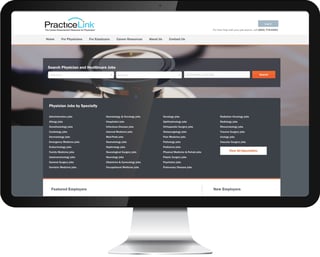
I recently started following a popular Twitter feed called Advice to Writers. It's just what it sounds like, a stream of inspirational tips from professional writers to aspiring writers. Since I've been following the feed, I've noticed a common theme throughout the writers' advice: They advise editing ruthlessly. They advise weeding out the very words you worked so hard to choose, all in the name of making a point clear. (Stephen King calls this "killing your darlings.")
The same advice could apply to your job postings. Though, as a physician recruiter, you may not see yourself as a writer (at least it's not your day job), the truth is that if you produce job postings, you are writing — and publishing, for that matter. You're writing work that's read by hundreds if not thousands of people, which means editing is imperative (if you want to get your point across, that is).
Now is the time when you may throw up your hands and say, "But I don't have time to edit ruthlessly. I'm not trained to know what to cut and what to keep." Well, I know a shortcut.
Here's your Power Tip: After you write a job posting, paste it into the Hemingway Editor. This free tool does to prose what spellcheck does to spelling. It points out the sentences and words that will trip people up. It even uses the Automated Readability Index to gauge the reading level of your text.
I randomly selected three PracticeLink job postings and pasted them into the Hemingway Editor to see what it would find.

These postings averaged a readability level of 18 (college-level), and half the total sentences scored as "very hard to read."
Of course, you're writing for physicians, who all have training way beyond that of a college student. But to give you some perspective, Hemingway (from whom the app gets its name) wrote at a 5th-grade reading level ... for adults.
As the app's website puts it, "Writing that scores at a 15th grade level is not better than writing at an 8th grade level. In fact, a high grade level often means it is confusing and tedious for any reader. Worse, it's likely filled with jargon. After all, unless you're writing a textbook (and even then), you don't want it to sound like a textbook."
It's true that your audience can make sense of medical textbooks, but they're likely not expecting a job posting to read like a medical textbook. They want something scannable, digestible. That's not to say that you should cut your specialty-specific keywords or details about which procedures a physician would perform, but it is to say that, when you can simplify, you should. Clarity is key — it was for Hemingway, and it should be for physician recruiters too.









